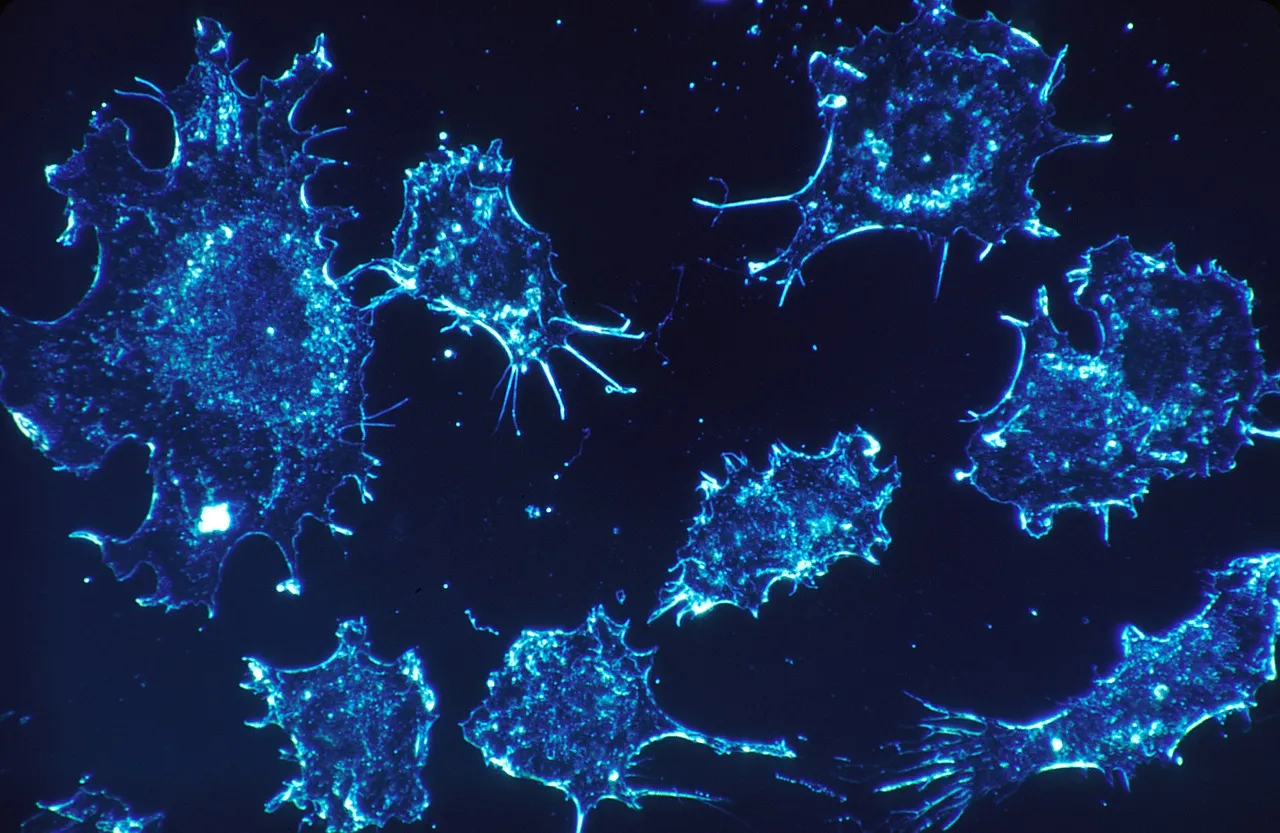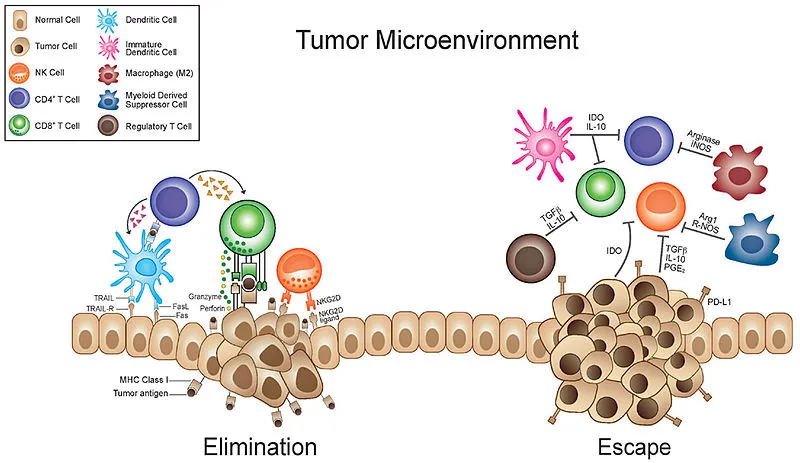A healthy human immune system is like a war ship missile defence system that is always on surveillance seeking to destroy any threat that comes under its radar. But still, it is of great misery how cancer cells escape surveillance from the immune system by invading the body and causing malignancy. First of all, lets understand the relationship between the immune system and cancer.

[image Source: pixabay CC0 licensed]
The immune system
The immune system is the body's defence system which protects it from diseases causing pathogens. The immune system is comprise of the white blood cells, antibodies and other biochemicals that helps in fighting against harmful foreign substances such as cancer cells, viruses, bacterias, toxins etc. The immune system is made up of two parts which are the Innate defence system and and the Adoptive defence system.
The Innate defence system is the first line of defence which the body uses to attack intruding pathogens immediately or withing the very few hours of encountering it. The Innate defence system is non-specific and it doesn't have a memory, so it is unable to recognize a pathogen that it has come in contact with before.
On the other hand, the Adaptive defence system system is very specific. It is only triggered when it comes in contact with an antigen that is already known. The adaptive immune system has memory unlike the Innate defence system, It is able to recognize a specific pathogen after initial encounter with it. This memory is created so as to have enhanced quick response towards pathogens anytime it encounters it again. This is the reason why chicken pox infects a person only once in a life time.
Cancer

[image Source: pixabay CC0 licensed]
Cancer is one of the most deadliest and most talked disease affecting humans in the 21st century. Cancer cells are abnormal cells that escape the surveillance of the immune system to invade other parts of the body with a very high level of proliferation. Carcinogenens which are cancer causing agent are numerous and some of them are present in the food we eat, the air we breath, chemicals such as the ones used in making the creams we use and the sunlight we are exposed to.
Every human would have one way or the other been affected with cancer if not for the vigilance of our immune system which helps in destroying cancer cells at their early stage of life before maturation. But despite the active surveillance of the immune system, cancer cells still develop in the presence of an actively functioning immune system which leads us to the discussion of immunoeditting, a hypothesis made by Schreiber et. al., (2011).
Immunoeditting
Immunoeditting describes the relationship between the surveillance of the immune system and the methods used by cancer cells to escape death. It encompasses three phases which includes Elimination, Equilibrium and the Escape phase.

[image Source: wikimedia commons Author: Frontiers in Oncology. CC BY-SA 3.0 licensed]
Elimination phase : This is the phase which immuno surveillance is predominant. In this phase, nascent cancer cells which arises in the body are been detected and eliminated immediately.
Equilibrium phase : This is the phase between the elimination phase and the escape phase where cancer cells are partially eliminated. In this phase, cancer cells improvise various mechanism to escape been detected by the immune system. Some of the cancer cells which goes undetected by the immune system are selected for growth and then they pass on to the escape phase.
Escape phase : This phase can also be referred to as the growth phase whereby cancer cells that escaped from the elimination phase begins to grow and proliferate real quick resulting into malignancy.
Lets discuss some of this mechanism used by cancer cells to escape elimination as mentioned in the Equilibrium phase.
Mechanism of escape
Defects in major histocompatibility complex (MHC) class I molecule : Since cancer cells are very smart, one of the common ways they use to avoid been detected by the immune system is by down regulating major histocompatibility complex class 1 molecule, this can be caused by loss of heterozygosity on chromosome 6p21 and by point mutation (Topfer et. al., 2011).
Suppression of Natural killer cells : Natural killer cells which aids in fighting and killing of cancer cells are been suppressed by cancer cells. Cancer cells produce very high amount of transforming growth factor-β. Transforming growth factor-β is a protein that suppresses the activities of natural killer cells (Viel et. al., 2016).
Suppression of Macrophage activities : Macrophages are large white blood cells that are responsible for engulfing invading cancer cells, bacterias, virus etc. These very smart cancer cells suppresses the activities of macrophages by presenting a transmembrane protein called CD47, a protein which binds to Signal regulatory protein α (SIRPα) present on the surface of macrophage which then reduces its ability to attack and kill the cancer cell (Xiang et. al., 2017).
Despite the theories of immunosurveilance and immunoeditting, there are various ways by which scientific researchers have developed to help boost our immune system to fight against cancer. Some of this ways is what will be discussed below
Immunotherapy
The process of taking preventive measures or treatment by stimulating the immune system with foreign substances to fight against cancer is referred to as immunotherapy. Immunotherapy is divided into two phase which are Non specific and Specific immunotherapy.
Non Specific immunotherapy
The non specific therapy is the type of therapy that doesn't target cancer cells specifically, it involves stimulating the immune system in a general way with foreign substances not minding their antigen specificity, in other to boost the the immune system. Examples of non specific immunotherapy are Bacille Calmette-Guerin (BCG) therapy, cytokines and cell therapy.
Specific immunotherapy
As the name implies, specific immunotherapy involves the transfer of specific cells that are capable of stimulating a particular immune response. This stimulation can be achieved by two ways which are (i) Vaccination a process which involves the introduction of a particular antigen to stimulate a particular response in order to aquire adaptive immune response. Some of these vaccines includes tumour based vaccine, virus based vaccines, protein and peptide based vaccines etc (ii) Adoptive transfer which involves the transfer of specific immune cells into the body e.g genetically engineered T cells, Lymphocytes.
Other ways to boost the immune system naturally
One of the ways to boost the immune system is by doing so naturally. One of the ways to attain this is by consuming foods, vegetables and fruits that contains high contents of carotenoid, flavoniods and antioxidants. Many fruits such as watermelon, soar sop and others are said to contain cancer fighting agents like lycopene, Vitamin C and E etc that helps to fight against cancer by boosting the immune system.
The future of immunotherapy
The future of immunotherapy seems very promising even though we lack complete knowledge of how the immune system works. Although, there have been really great improvements compared to accent times, some of this improvements includes the use of advance computing to develop drug dosage for clinical trials, stimulate the effect of immunotherapy drugs and to analyze, store and predict the future generation immune protein data. In the future, immunotherapy is said to be combined with chemotherapy and radiation to further enhance the fight against cancer. This combination will lead to major breakthrough for immunotherapy to specifically target cancer cells.
Conclusion
In conclusion, early detection of cancer is important for the successful management and treatment of it. It is advisable we all be watchful of every part of our body. Also, i would say that the immune system is the most vital part of the human body even though we don't take any notice of its wonderful work, otherwise we would have been infected by various diseases. So we should be thankful to our immune system for its active vigilance like that of the war ship missile defence system. Thank you for reading.
References for further reading
Xiang Y.R., Liu L. (2017). “Eating” Cancer cells by blocking CD47 signaling: Cancer therapy by targeting the innate immune checkpoint. Pubmed. Retrieved Aug 20, 2018 from http://www.cancertm.com/article.asp?issn=2395-3977;year=2017;volume=3;issue=6;spage=200;epage=208;aulast=Xiang
Kim R. et. al., (2007). Cancer immunoediting from immune surveillance to immune escape. Immunology. Retrieved Aug 20, 2018 from https://www.ncbi.nlm.nih.gov/pmc/articles/PMC2265921/
Schreiber R.D., et al., (2011). Cancer immunoediting: integrating immunity's roles in cancer suppression and promotion. Science. vol. 331, pp. 1565–1570 retrieved Aug 19, 2018 from http://science.sciencemag.org/content/331/6024/1565
Takahashi S., (2017). Molecular functions of SIRPα and its role in cancer (Review). Retrieved Aug 20, 2018 from https://www.spandidos-publications.com/br/9/1/3
Viel S. et. al., (2016). TGF-β inhibits the activation and functions of NK cells by repressing the mTOR pathway. Immunometabolism. Retrieved Aug 20, 2018 from http://stke.sciencemag.org/content/9/415/ra19.long
Topfer et. al., (2011). Tumor Evasion from T Cell Surveillance. Journal of Biomedicine and Biotechnology. Retrieved Aug 19, 2018 from http://dx.doi.org/10.1155/2011/918471